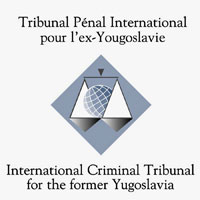ICTY Appeals Chamber Renders Judgment in Case of Stanišić and Simatović
 The Appeals Chamber of the International Criminal Tribunal for the Former Yugoslavia (ICTY) rendered a judgment on 15 December 2015 in the case of the former heads of the Serbian State Security Service (SDB), quashing the first instance judgment on account of errors in law, and ordering a retrial. The Humanitarian Law Center (HLC) maintains that the court’s decision is correct, and points out that in the case of the former Chief of General Staff of the Yugoslav Army, Momčilo Perišić, the ICTY made a serious mistake and that, had the Chamber not erred, he would have been held accountable for the assistance that this institution had provided to the Republic of Srpska Army in the commission of systematic crimes against the non-Serb civilian population.
The Appeals Chamber of the International Criminal Tribunal for the Former Yugoslavia (ICTY) rendered a judgment on 15 December 2015 in the case of the former heads of the Serbian State Security Service (SDB), quashing the first instance judgment on account of errors in law, and ordering a retrial. The Humanitarian Law Center (HLC) maintains that the court’s decision is correct, and points out that in the case of the former Chief of General Staff of the Yugoslav Army, Momčilo Perišić, the ICTY made a serious mistake and that, had the Chamber not erred, he would have been held accountable for the assistance that this institution had provided to the Republic of Srpska Army in the commission of systematic crimes against the non-Serb civilian population.
In May 2013, Jovica Stanišić and Franko Simatović were acquitted on all counts of the indictment charging them with participation in a joint criminal enterprise (JCE) with the common criminal purpose of forcible and permanent removal of the majority of non-Serbs from large areas of Croatia and Bosnia and Herzegovina, by way of murder, deportation, forcible transfer and persecution. In each count of the indictment, they were also charged with aiding and abetting the commission of these crimes. The Trial Chamber found in the first instance judgment that the assistance that Stanišić and Simatović had rendered to the units, principally the Red Berets and the Militia of the Autonomous Province of Srpska Krajina (SAO Krajina Militia), but also to other formations, such as the Scorpions and the Serb Volunteer Guard, which were founded, trained, armed, equipped and controlled by the accused and the Serbian SDB, was not “specifically directed” towards the commission of the crimes, but rather towards “establishing and maintaining control by (Serb) authorities” over parts of Croatia and Bosnia Herzegovina. As for their participation in the joint criminal enterprise, the Trial Chamber concluded that it did not believe that the only reasonable conclusion emerging from the evidence is that they had the intention to further the purpose of this JCE.
The Prosecution alleged in its appeal that the Trial Chamber had erred in law by failing to provide a reasoned opinion regarding the essential elements of JCE liability, in particular, the existence of a common criminal purpose and Stanišić’s and Simatović’s contributions to it. In addition to this, the Prosecution alleged that the Trial Chamber erred in law by concluding that the acts undertaken by the individuals who were aiding or abetting the commission of the crime must have been “specifically directed” towards the commission of the crime, and that had the Trial Chamber not so erred, it would have found the accused guilty of aiding and abetting the commission of the crimes as charged in the indictment.
The Appeals Chamber found in its judgment that the Trial Chamber erred in law by failing to adjudicate and provide a reasoned opinion on essential elements of JCE liability, namely, the existence of a common criminal purpose and Stanišić’s and Simatović’s contribution to the common criminal purpose of the JCE. The Appeals Chamber further concluded that “specific direction” is not an element of liability for aiding and abetting under customary international law.
Consequently, the Appeals Chamber ordered a retrial on all counts of the indictment, and explicitly ordered that the Trial Chamber composed for the retrial should apply “the correct law on aiding and abetting liability, which does not require that the acts of the aider and abettor be specifically directed to assist the commission of a crime”.
The judgment of the ICTY Appeals Chamber definitely dismissed “specific direction” as an element indicating liability for aiding and abetting, which was introduced into ICTY practice by the Appeal Judgment rendered in the case of Momčilo Perišić in 2013. Namely, Momčilo Perišić was found guilty by the Trial Judgment and convicted to 27 years of imprisonment because he, in the capacity of the Chief of General Staff of the Yugoslav Army, provided large-scale logistics support, huge amounts of infantry and artillery ammunition, fuel, spare parts, training and expert assistance to the Army of the Republic of Srpska, despite knowing that their operations entailed the commission of serious crimes against a civilian population. The Appeals Chamber acquitted him by a second instance judgment, explaining that his assistance was not “specifically directed” at the commission of the crimes, despite the finding of the Trial Chamber that “Perišić’s logistical assistance and personnel assistance, individually and cumulatively, had a substantial effect on the crimes perpetrated by the VRS in Sarajevo and Srebrenica, as charged in the Indictment ” (par. 1627).
Prior to the Appeal Judgment in the case of the accused Jovica Stanišić and Franko Simatović, the ICTY Appeals Chambers had explicitly dismissed the standard of “specific direction” as an element indicating liability for aiding and abetting, in their final judgments rendered in the Popović et al. and Šainović et al. cases, stating that it did not represent part of international customary law or the practice of the ICTY.
The dismissal of this standard, however, will not affect the final acquittal rendered in the Perišić case. Namely, in February 2014, following the Appeal Judgment rendered in the Šainović et al. case, which dismissed the standard of “specific direction”, the Prosecution filed a motion for the reconsideration of the not guilty judgment rendered in the case of Momčilo Perišić in the “interest of justice and victims”. However, the ICTY Appeals Chamber denied this motion.







